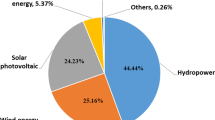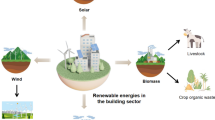Abstract
A three-generation planning model incorporating uncertain climate change is developed. Each generation features a production activity based on capital and an exhaustible resource. An irreversible climate change may occur in period two or three, reducing the productivity for this and the remaining generation. The model is solved by stochastic dynamic programming. If the climate impact and climate change probability is constant, the optimal period one (and two) resource extraction is larger than for the reference case of climate stability. If, however, climate impact and climate change probability increases with increased aggregate resource use, this result is reversed.
Similar content being viewed by others
References
Arrow, K. J. and A. C. Fisher (1974), ‘Environmental Preservation, Uncertainty, and Irreversibility’, Quarterly Journal of Economics 88, 312-319.
Blanchard, O. J. and S. Fischer (1989), Lectures on Macroeconomics, MIT Press, Cambridge and London.
Cicchetti, C. J. and A. Myrick Freeman, III (1971), ‘Option Demand and Consumer Surplus: Further Comment’, Quarterly Journal of Economics 85, 528-539.
Conrad, J.M. and C. W. Clark (1987),Natural Resource Economics-Notes and Problems, Cambridge University Press, Cambridge.
d'Arge, R. C., W. D. Schulze, and D. S. Brookshire (1982), ‘Carbon Dioxide and Intergenerational Choice’, American Economic Review, Papers and Proceedings 72(2), 251-256.
Dasgupta, P. S. and G. M. Heal (1979), Economic Theory and Exhaustible Resources, Cambridge University Press, Cambridge.
Fisher, A. C. and W. M. Hanemann (1990), ‘Information and the Dynamics of Environmental Protection: The Concept of the Critical Period’, Scandinavian Journal of Economics 92(3), 399-414.
Gottinger, H. W. (1992), ‘Economic Models of Optimal Energy Use under Global Environmental Constraints’, in R. Pethig, ed., Conflicts and Cooperation in Managing Environmental Resources, Springer Verlag, Berlin.
Henry, C. Houghton, J. T., G. J. Jenkins, and J. J. Ephraums, eds. (1990), Climate Change-The IPCC Scientific Assessment, World Meteorological Organization and United Nations Environmental Program, Intergovernmental Panel on Climate Change, Cambridge University Press, Cambridge and New York.
Houghton, J. T., B. A. Callander and S. K. Varney, eds. (1992), Climate Change 1992-The Supplementary Report to the IPCC Scientific Assessment, World Meteorological Organization and United Nations Environmental Program, Intergovernmental Panel on Climate Change, Cambridge University Press, Cambridge and New York.
Howarth, R. B. (1991), Economic Efficiency, Intergenerational Equity, and Uncertainty: An Application to Climate Change, Paper presented to the Peder Sather Symposium on Global Climate Change, Berkeley, California, October 16-18, Lawrence Berkeley Laboratory, Berkeley.
Manne, A. S. and R. G. Richels (1990), ‘Buying Greenhouse Insurance’, draft of a chapter in the forthcoming monograph, Global 2100: The Economic Costs of CO2 Emission Limits, Stanford University and Electric Power Research Institute.
Ravindran, A., D. T. Phillips, and J. J. Solberg (1987), Operations Research-Principles and Practice, 2. ed., John Wiley & Sons, New York and Chichester.
Rust, J. (1991), ‘Stochastic Decision Processes’, draft of Chapter 16 in R. F. Engle and D. McFadden, eds., Handbook of Econometrics, Vol. 4, North-Holland, Amsterdam and New York.
Solow, R. M. (1974), ‘Intergenerational Equity and Exhaustible Resources’, Review of Economic Studies, 29-45.
Spash, C. L. and R. C. d'Arge (1989), ‘The Greenhouse Effect and Intergenerational Transfers’, Energy Policy 17(2), 88-96.
Sydsæter, K. (1990), Matematisk analyse-Bind II, in collaboration with A. Seierstad and A. StrØ m, 3. edn., Universitetsforlaget, Oslo.
Ulph, A. and D. Ulph (1994a), ‘The Optimal Time Path of a Carbon Tax’, Oxford Economic Papers 46, 857-868.
Ulph, A. and D. Ulph (1994b), ‘Global Warming: Why Irreversibility May Not Require Lower Current Emissions of Greenhouse Gases’, Discussion Papers in Economics and Econometrics, No. 9402, University of Southampton.
Withagen, C. (1994), ‘Pollution and Exhaustibility of Fossil Fuels’, Resource and Energy Economics 16(3), 235-242.
Zeckhauser, R. (1969), ‘Resource Allocation with Probabilistic Individual Preferences’, American Economic Review 59, 546-552.
Author information
Authors and Affiliations
Rights and permissions
About this article
Cite this article
Torvanger, A. Uncertain Climate Change in an Intergenerational Planning Model. Environmental and Resource Economics 9, 103–124 (1997). https://doi.org/10.1023/A:1026442931362
Issue Date:
DOI: https://doi.org/10.1023/A:1026442931362




